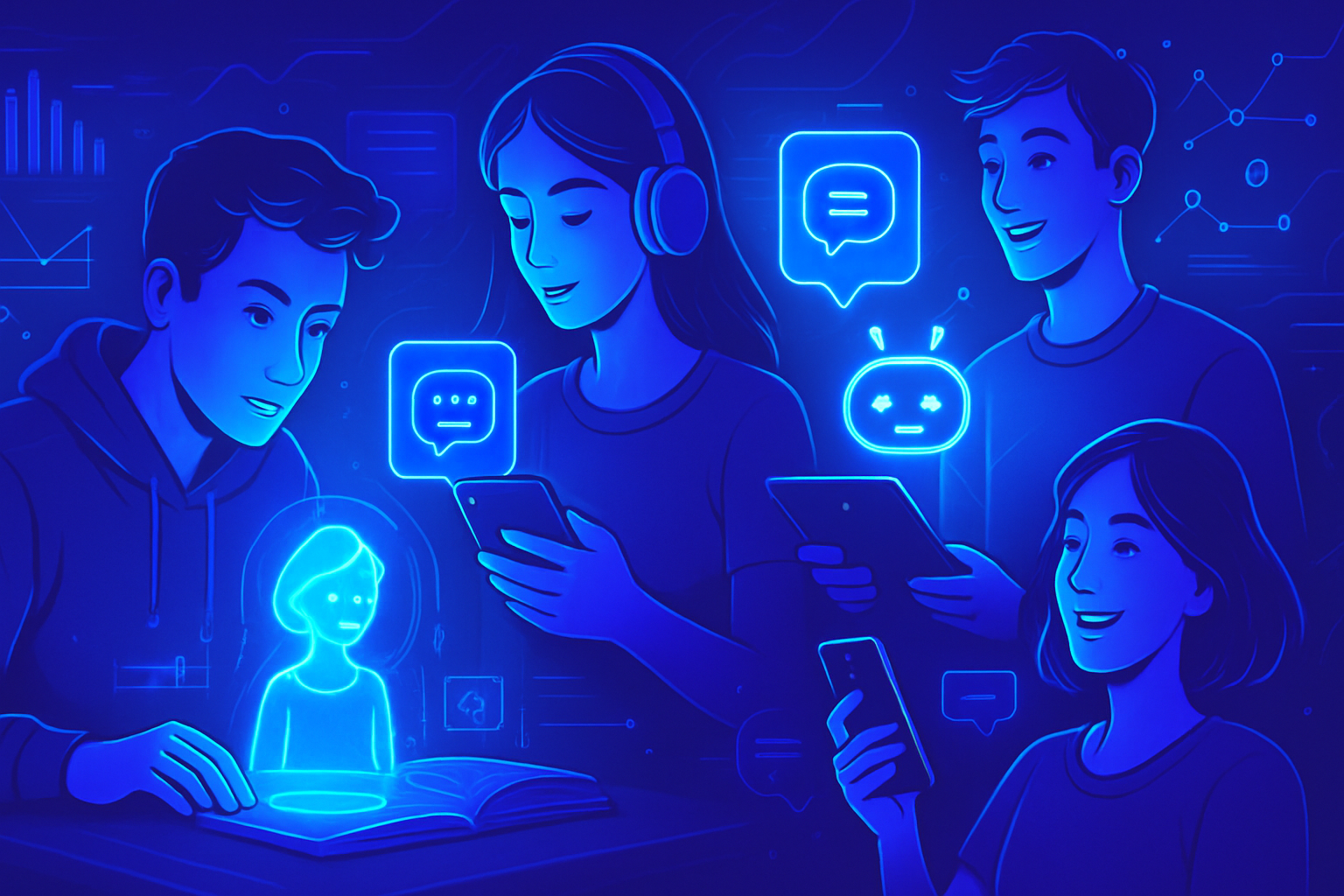The meteoric rise of AI assistants is redefining the routine of young adults. *42% of 18-25 year-olds* use them daily, revealing a paradigm shift in technological interaction. The importance of these tools transcends mere practicality; they are becoming indispensable allies in the quest for efficiency. *Young people use them to seek information,* but also to optimize their daily energy. *A significant leap in their adoption* reflects the evolution of behaviors toward technology.
A massive adoption of AI assistants by young people
A study conducted by Heaven agency reveals that AI assistants are now ubiquitous in the daily lives of young adults. 42% of people aged 18 to 25 use these tools at least once a day, a number that has doubled compared to the previous year. Nearly 80% of young respondents mentioned weekly use of these revolutionary technologies.
A diverse use of AI tools
AI tools, such as ChatGPT, have become valuable allies for information search. 92% of young people use AI assistants for this purpose, while 84.4% integrate them in an academic or professional context. The consequences are evident: a majority of users feel efficiency gains, even though 48% of them fear a risk of cheating.
A democratized and accessible technology
Contact with AI assistants is widespread, reaching unprecedented levels among younger generations. About 93% of them have interacted with services like ChatGPT over the past six months, a telling figure of the rise of smart technologies. Boys and girls show similar usage rates, 93% and 94% respectively.
A flourishing diversity of tools
ChatGPT ranks at the top of artificial intelligence tools, used by 84.6% of respondents. New entrants, such as Meta’s AI, are showing strong growth, reaching 35.6%. Young people are also turning to various solutions such as My AI, Copilot, and Character.ai, each offering distinct features. They engage in voice interactions, representing 19% of regular usage.
A growing dependence on AI recommendations
AI assistants also influence purchasing decisions. 41% of young people consult them for advice on outings or travel. One in three young individuals admits to having used AI recommendations to make a purchase, while 15% have already made a purchase based on such suggestions. This phenomenon highlights the rise of AI integration into daily life.
A critical view of AI tools
Despite the general enthusiasm for these technologies, a certain caution prevails. 81% of young people acknowledge the time benefits but remain aware of potential drawbacks, such as the possibility of obtaining incorrect results. AI is regarded as the 4th most reliable source of information, even ahead of Wikipedia and influencers.
Evolution of young people’s behaviors towards AI
Young people are quickly adapting to these new practices. A recent study reveals that nearly 88.1% of young people use mobile AI assistants, thus demonstrating the importance of portability in their digital habits. PC usage remains significant as well, with nearly 69.1% of young people utilizing these tools on their computers.
Trust in information tools
Young adults see AI as a reliable source of information, justified by its ability to process a large amount of data efficiently. The use of these tools is already an integral part of new learning and research methods, thereby fostering an evolution in mindsets around artificial intelligence.
For a more in-depth overview and trends, the article explores various topics, such as generative artificial intelligence tools, use cases of AI in various sectors, and the path toward the integration of intelligent assistants into everyday life, as illustrated in recent initiatives.
The insights provided by this study illuminate the perspectives of a generation that quickly adopts digital tools, thus outlining the contours of a future where artificial intelligence is omnipresent.
FAQ: Young people and the adoption of AI assistants in their daily lives
Why do young people use AI assistants daily?
Young people adopt AI assistants primarily for their efficiency in information search and task completion, as well as for recommendations and advice suited to their daily lives.
What percentage of young people use AI assistants at least once a day?
42% of young people aged 18 to 25 use AI assistants every day, which represents a significant increase compared to the previous year.
What types of AI assistants are most popular among young people?
ChatGPT is the most widely used AI assistant, with 84.6% of young people having adopted it, followed by Snapchat’s My AI at 43.4%, and Meta’s AI, which has quickly gained popularity.
Do young people consider AI assistants reliable?
Yes, AI assistants are perceived as the fourth most reliable source of information, just after teachers and search engines, thus attesting to their growing credibility among young people.
How do young people practically use AI assistants?
They use them primarily for information search, completing academic and professional tasks, as well as for casual interaction.
Do young people feel guilty about using AI assistants for their studies?
They are divided: 48% feel it could be plagiarism, while 54% believe it is essential to use these tools to avoid being disadvantaged.
What is the impact of AI assistants on young people’s time management?
71% of young people say that using AI assistants saves them time in their daily tasks.
Do AI assistants influence young people’s purchasing decisions?
Yes, 41% of young people turn to AI for recommendations when going out or traveling, and 15% have purchased products based on AI suggestions.
Do young people use AI assistants on mobile or PC?
Young people widely use these tools on mobile (88.1%) and on PC (69.1%), demonstrating their flexible use according to situations.
What is the future of AI assistant usage among young people according to recent studies?
A broad consensus indicates that the use of AI assistants is expected to continue to grow, with increasingly strong adoption among young people.






